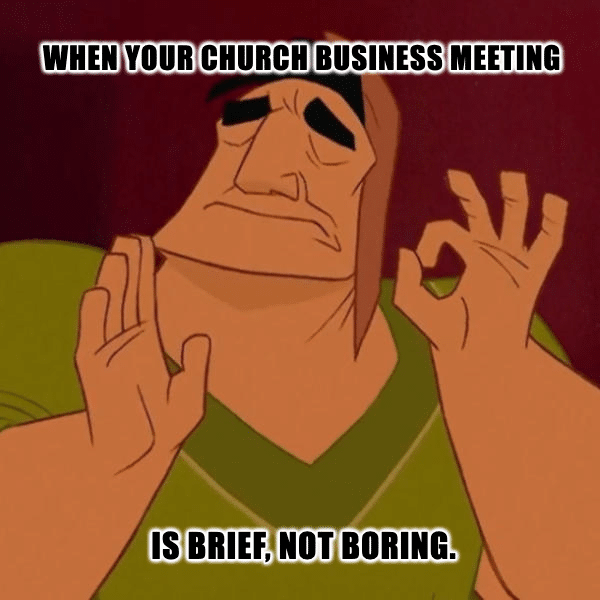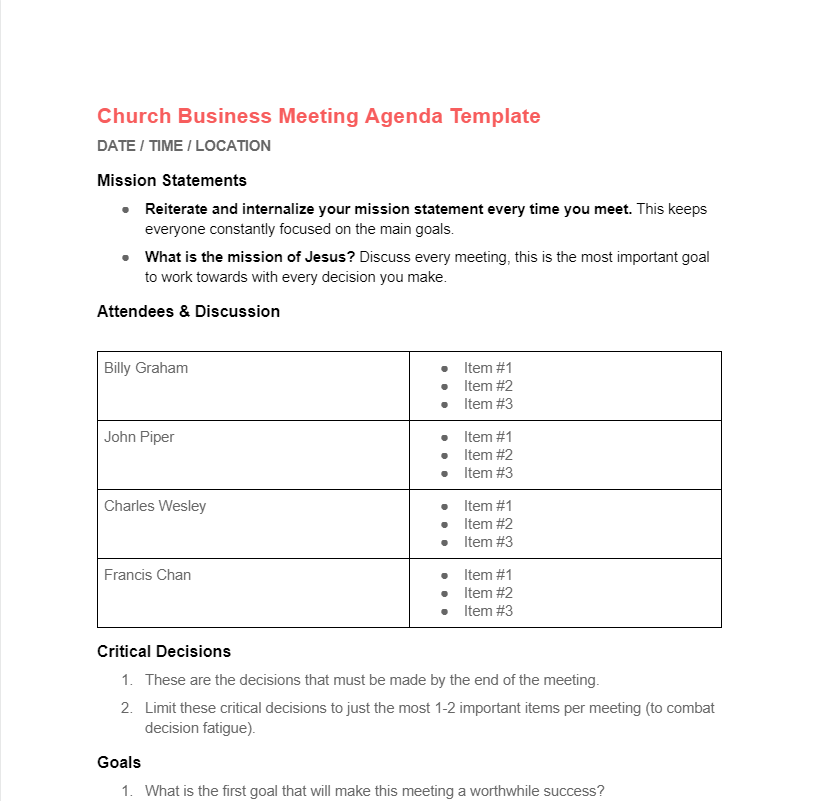You know that one Peanuts cartoon where Peppermint Patty falls asleep in class while her teacher drones on and on? I've sat through countless church business meetings like that during my twenty-ish years in ministry. Ugh... horrid, painful things! In all honesty, I've LED some of those. Why are they so terrible? Because too often, attendees arrive at church business meetings with different expectations and priorities. As a result, we spend more time in conflict than we do in conversation.
Everything changed, though, once we instituted this key rule: no meeting without an agenda. After that, meetings improved (aided in no small part by our church management software) and became a vital part of our church management toolbox!
The number one thing you need to keep meetings as brief as necessary is a well-crafted agenda.
Joshua Gordon
The most effective meetings have an agenda that allows everyone to voice their opinions, keeps tangents to a minimum, and clarifies what goals are going to be achieved. This article will give you everything you need to achieve THAT. Here’s what’s coming up:
- What Is A Church Business Meeting?
- What Should Be Covered In A Church Business Meeting?
- Church Business Meeting Agenda Template

What Is A Church Business Meeting?
A church business meeting is a gathering where attendees discuss and make decisions about the church's activities, finances, and future plans.
Too often, we see these meetings as a "necessary evil." But that is a grim interpretation of the situation. An honest moment here: it's just a bad attitude to have. Every meeting can be an opportunity to move the needle forward on the missions of the church and of Jesus.
In fact, with this working definition, we can say whether or not these meetings truly have purpose and value. If they don't, then you have a set clear criteria to justify disbanding or re-purposing these meetings.
Regardless of the type of meeting, there is usually one person who is put in charge of creating the meeting agenda. In many churches, the lead pastor is responsible for ensuring these meetings run smoothly.
What if that isn't your gift, though? Not every leader is an administrator. We need to know what should be covered in these meetings so we can define the goals for each meeting. This will help even those who are not administrative-minded be the best they can be with the duty placed on them. (Read more about what you can learn about church management from the business world.)
What Does A Great Church Business Meeting Template Accomplish?
With our new definition in mind, we can begin to talk about what could and should be covered in these meetings. This also means we will need a clearly defined agenda to use for each meeting.
Every agenda should be concerned about:
- The attendees
- An orderly discussion
- The mission of the church
- The mission of Jesus
- Decisions that need to be made
- Goals to be accomplished
If a meeting agenda can accomplish all of this, then every church meeting can have value and advance the church's goals.
WHO Will Be in Attendance?
Each agenda needs to state who should be at the meeting. The people who are coming to the meeting (and the church leadership role they hold) will largely determine what gets discussed, the types of conversation that can be expected, and, to some degree, what politics may be at play (and need to be avoided).
What Will Be Discussed (by Whom)?
Every meeting needs to have a layout that addresses who will be talking and what they will be talking about.
This section will be customized based on the type of meeting and who will be attending. Getting this order right and making sure each member can share what they need to say will go a long way to ensuring every member feels seen and heard.
A great practice to keep these discussions orderly is to allow a set amount of time per item. This keeps everyone hyper-focused on what they need to say to communicate their points effectively.
From there, you can allow for a set amount of time for others to ask and answer questions. At the end of the time, the group needs to make a decision on the item. If no decision can be made right away or there is a bigger discussion to be had, then set that item as a priority for the next meeting.
Top Five Tools to Streamline Your Ministries
Much like church business meetings need the streamlining structure of a well-crafted agenda, church management strategies need the robust structure of a best-in-class church management software tool. These are our top picks. Each tool on this list has been thoroughly vetted by my team and I.
Which Decisions Need To Be Made
Each meeting agenda should list all critical decisions that must be made. Keep this to the absolute most important items on the agenda. Truly, there are only a handful of critical decisions that deserve the most attention in each meeting. Don't let your attendees get bogged down with decision overload. Note: some of the best church software tools we've ranked and evaluated offer file-sharing features... which means you can easily share documents, media, etc to assist in your meetings.
If no other decisions get made, these should be the items that get the most discussion.
Which Goals Need To Be Accomplished?
Clearly defining the goals of each meeting will go a long way to making sure each meeting stays on track and moves the mission of the church forward.
Throughout the meeting, confirm whether or not goals are being met with each decision made. Let the goals be the litmus test whether or not the meetings are worth it and are staying on track. If an item doesn't push the goals forward, then it can probably be removed entirely.
What Is the Mission?
At every meeting, the mission of the church needs to be a topic of discussion. It needs to be its own line item for every meeting. People need to be sick of hearing about the mission because this will guarantee the mission becomes internalized within the community.
The same is true for the mission of Jesus. This needs to be discussed at every meeting. If we cannot internalize the missions of the church and of Jesus, then all church meetings will fall short.
Free Template: Customize Appropriately!
If you want to start with a rock-solid template, then here is our master church business meeting agenda just for you!
One note about customizing these agenda templates: it needs to stay on target. If a change only slows down the process, impedes decision-making, or alienates members or goals, then it isn't worthwhile.
That being said, the types of decisions considered critical may differ from a board meeting to a finance committee meeting to a youth board meeting. Don't hesitate to make an executive decision about what is considered critical when you are the leader. It is your role to keep making sure goals are being met, the mission is being internalized, and that volunteers have a chance to voice their opinions.
This agenda has been tested in ministry settings, and I’ve even used it to decrease the amount of time spent in meetings and increase our ability to make decisions that affect our church and ministry goals!
Church Business Meeting Agenda Template

Boring to Brief: Meetings With a Purpose!
Hopefully, this guide makes even the least administrative-minded leader seem like a superhero for their church! All it takes is dedication to ensure that every meeting is focused on Jesus's mission and vision. If an agenda helps you do that better, then let's celebrate it and do it well!
For more guidance on church business plans and so much more, we would love for you to check out our website for articles about risk management, church marketing strategies, and the best church management software.
Was this article helpful? If so, you'll dig our newsletter.
It's packed with insightful, seasoned advice from other pastors and church leaders. It's good stuff, written by pastors like you (and me, for that matter.) We'd love to have you. Sign up here.


